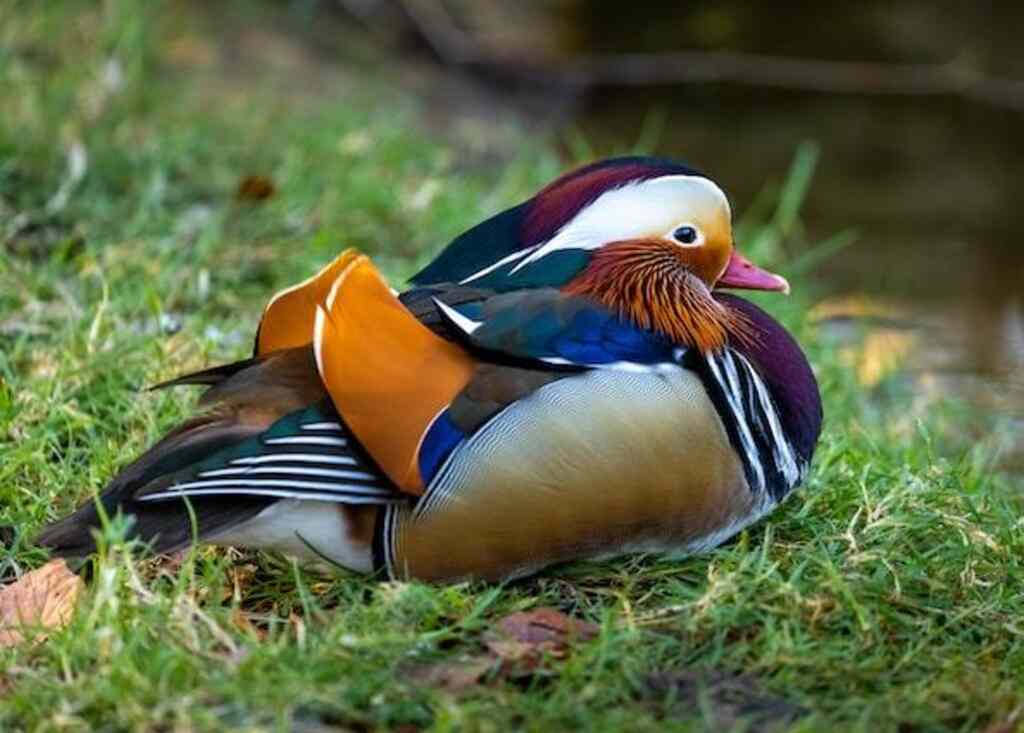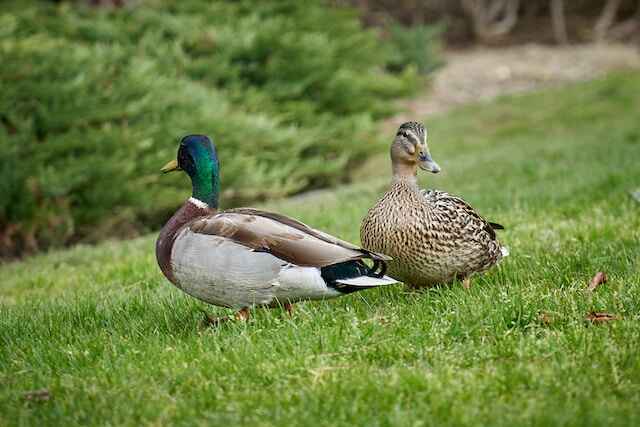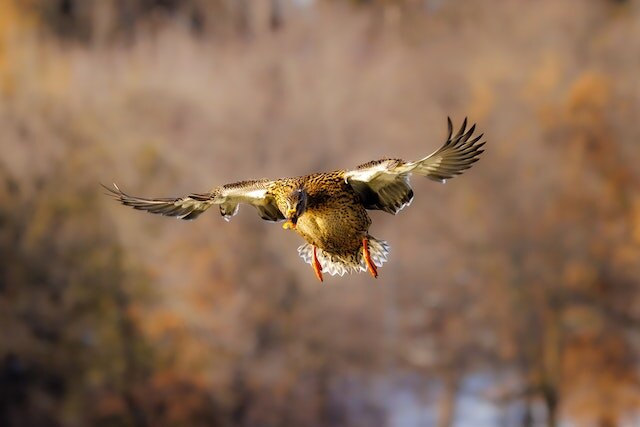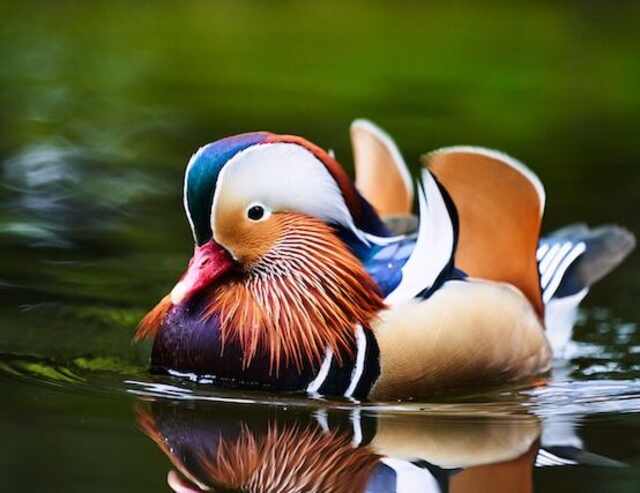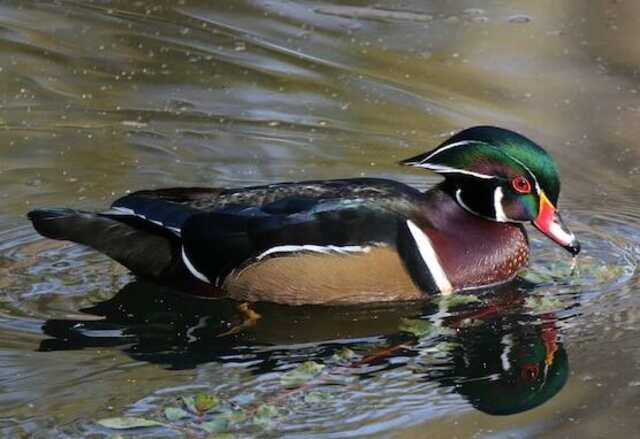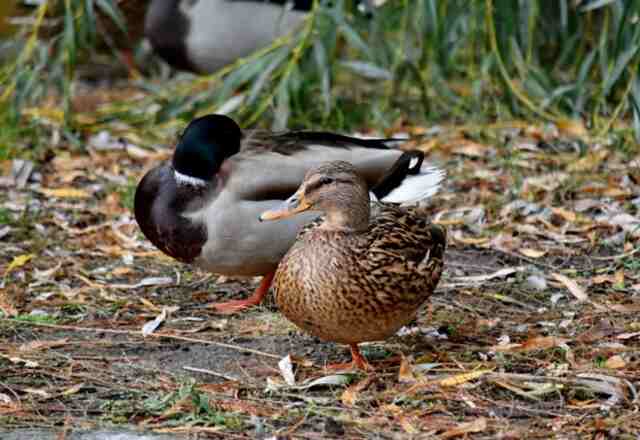Quack, quack, where do ducks sleep? The answer may surprise you! While you might picture ducks drifting peacefully on a pond, the truth is that these feathered friends have some unique sleeping habits. So where do they rest their heads at night? The short answer: it depends!
But fear not, because in this article we’ll dive into the fascinating world of duck sleeping habits, exploring everything from nest-building to nocturnal behaviors. So, grab your duck call and let’s get started!
Table of Contents
- 1 Adaptable Ducks: How and Where They Sleep
- 2 Duck Sleeping Habits
- 3 Duck Nesting and Roosting Behaviors
- 4 Wetland Ecology and Wildlife Refuge
- 5 Duck Shelter and Protection
- 6 FAQs: Where Do Ducks Sleep?
- 6.1 Do ducks sleep on land or water?
- 6.2 Do ducks sleep standing up?
- 6.3 How long do ducks sleep for?
- 6.4 Do ducks sleep during the day or night?
- 6.5 Do ducks sleep in nests?
- 6.6 Do ducks sleep in groups?
- 6.7 Do ducks sleep with their eyes open or closed?
- 6.8 Can ducks sleep while swimming?
- 6.9 Where do domestic ducks sleep?
- 6.10 Do ducks need a specific type of roosting area?
- 7 Conclusion
- 8 Author
Adaptable Ducks: How and Where They Sleep
When it comes to roosting, ducks are quite adaptable. Some species sleep on the water, while others prefer to sleep on land. They can sleep standing on one or two legs, or even while sitting with their head tucked into their feathers.
Additionally, ducks have the ability to sleep with one half of their brain while the other half remains active, a phenomenon known as unihemispheric slow-wave sleep.
As a result, ducks are able to stay vigilant to potential dangers while also getting the rest they require.
Duck Sleeping Habits
Ducks are adaptable sleepers with unique sleeping habits that vary depending on the breed, environment, and time of year. Understanding their sleeping patterns is crucial to their survival, as they are prey animals and need to be on guard against predators.
In this section, we’ll explore the natural sleeping locations, roosting spots, and artificial habitats where ducks sleep.
Natural Sleeping Locations
Ducks have evolved to sleep in a variety of locations, including land and water. Some breeds prefer to sleep on land, while others sleep on the water.
The most natural place for a duck to rest is in the water, where they can float around on the surface with their body completely submerged underwater.
This allows them to rest while remaining alert to any potential threats.
Roosting Spots
Most species of ducks sleep in communal roosting sites on land or in the water, meaning they sleep close together in flocks.
Sleeping communally grants them safety in numbers, and they can be found roosting in large flocks of hundreds or thousands of birds.
Mallards, for example, are gregarious and sociable birds that prefer to sleep in large groups.
Artificial Habitats
Ducks are adaptable creatures and can sleep in artificial habitats such as nest boxes, duck houses, and other man-made structures.
These structures provide shelter and protection from predators, making them ideal for ducks to rest in. It is important to ensure that these structures are clean and dry to prevent the spread of disease.
In conclusion, ducks are flexible sleepers that can sleep on land and water, in communal roosting sites, and in artificial habitats.
Their unique sleeping habits, such as sleeping in short intervals, sleeping in groups, and sleeping unihemispherically, help them stay safe while they rest.
Understanding their sleeping patterns is crucial to their survival, and providing them with safe and comfortable sleeping locations is essential for their well-being.
Duck Nesting and Roosting Behaviors
Ducks are known for their flexible sleeping patterns. They can sleep on water or land, depending on the species and their environment. In this section, we will explore the nesting and roosting behaviors of ducks.
Breeding Behaviors
Ducks have a unique breeding behavior that involves the males competing for the females’ attention. Once the female selects a mate, they will pair up and begin building their nest. The male will often protect the female while she incubates the eggs.
Types of Nests
Ducks build different types of nests depending on their habitat preferences. Some species prefer to nest on the ground, while others prefer to nest in trees or on the water.
Ground-nesting ducks will often build their nests near water, while tree-nesting ducks will look for cavities in trees to use as their nesting site.
Habitat Preferences
Ducks have different habitat preferences depending on the species. Some prefer to live in wetlands, while others prefer to live in grasslands or forests.
Wetland-dwelling ducks will often build their nests near the water’s edge, while grassland-dwelling ducks will look for areas with tall grass to hide their nests.
Duck Flock Behavior
Ducks are social animals and often roost in flocks. This behavior allows them to stay safe in numbers and occupy the best roosting sites available in their habitat. Ducks will often sleep with one eye open to keep an eye out for predators.
Duck Pond Behavior
Domestic ducks that live in ponds will often sleep on the water’s surface. They will tuck their beaks under their wings and float along with the current. Wild ducks will also sleep on the water’s surface, but they will often find a secluded area to avoid predators.
Duck Coop Design
If you are raising ducks in a coop, it is essential to provide them with a comfortable sleeping area. Ducks prefer to sleep on soft bedding, such as straw or shavings. It is also important to provide them with enough space to move around and stretch their wings.
In conclusion, ducks have unique nesting and roosting behaviors that vary depending on the species and their environment. Understanding their behavior can help you provide them with a comfortable and safe living space.
Wetland Ecology and Wildlife Refuge
Pond Ecosystem
When it comes to where ducks sleep, wetlands play a crucial role. Wetlands are a unique ecosystem that is home to a variety of plants and animals.
Ducks typically sleep in or near wetlands, such as ponds, marshes, and swamps. These habitats provide ducks with the necessary resources to survive, such as food, water, and shelter.
Ponds are a vital part of the wetland ecosystem, providing a habitat for aquatic plants and animals. They are also the primary source of water for ducks to drink and bathe in.
Ponds come in different sizes, from small puddles to large lakes, and can be found in both rural and urban areas.
Habitat Conservation
Conserving wetlands is essential for the survival of ducks and other wildlife. Habitat loss due to human activities such as agriculture, urbanization, and pollution has led to a decline in wetland ecosystems.
This decline has resulted in a decrease in the number of ducks and other waterfowl species. Wildlife refuges are a crucial part of wetland conservation efforts.
These protected areas provide a safe haven for ducks and other wildlife to rest, feed, and breed.
The National Wildlife Refuge System is the largest protected area network in North America, with over 150 million acres of land stretching from Alaska to Florida.
Predators and Duck Sleeping Habits
Predators are a significant threat to ducks, especially when they are sleeping. Ducks are vulnerable when they are sleeping, as they are unaware of their surroundings.
Predators such as foxes, raccoons, and coyotes often prey on ducks while they are sleeping. To protect themselves from predators, ducks often sleep in groups.
Sleeping in groups allows ducks to keep watch while others sleep. Ducks also have the ability to sleep with one eye open, which allows them to keep an eye out for predators while they rest.
Migration and Duck Sleeping Patterns
Ducks have a unique sleeping pattern during migration. Most ducks spend all night in one spot, feeding, courting, preening, and performing basic maintenance behaviors until just before sunrise, when they move to resting areas.
Recent research shows that ducks do not hop between foraging areas after dark. During migration, ducks often sleep in open water or on small islands.
These areas provide ducks with protection from predators while they rest. Ducks also have the ability to sleep while swimming, which allows them to rest while still being aware of their surroundings.
In conclusion, wetlands play a crucial role in where ducks sleep. Conserving wetlands is essential for the survival of ducks and other wildlife.
Wildlife refuges provide a safe haven for ducks to rest, feed, and breed. Sleeping in groups and with one eye open allows ducks to protect themselves from predators while they rest.
Duck Shelter and Protection
As a duck owner, it’s important to provide your ducks with a safe and secure place to sleep. Here are some options to consider:
Duck Houses
Duck houses are a great option for providing shelter for your ducks. They can be made from a variety of materials such as wood or plastic and can be designed to accommodate different numbers of ducks. Make sure the house is well-ventilated and has enough space for your ducks to move around comfortably.
Nesting Boxes
Nesting boxes are essential for ducks that are laying eggs. They provide a safe and secure place for ducks to lay their eggs, and can also be used for sleeping. Nesting boxes should be cleaned regularly to prevent the buildup of bacteria.
Predator-Proof Coops
Predator-proof coops are important for protecting your ducks from predators such as foxes, raccoons, and coyotes. They should be made from sturdy materials and have secure locks to prevent predators from getting in.
Natural Shelters
If you have a natural pond or lake on your property, your ducks may choose to sleep on the water. Providing natural shelters such as bushes or trees around the pond can give your ducks a safe place to sleep.
Floating Platforms
Floating platforms can be used on ponds or lakes to provide a safe and secure place for ducks to sleep. They should be large enough to accommodate all of your ducks and should be anchored securely to prevent them from drifting away.
Safe Havens
If you have a large property, you may want to consider creating safe havens for your ducks. These can be fenced areas that are designed to keep predators out, or they can be areas that are protected by natural barriers such as bushes or trees.
When providing shelter for your ducks, it’s important to consider their roosting habits. Ducks can sleep on water or land, so make sure to provide options for both.
Additionally, make sure to provide bedding materials such as straw or wood shavings to keep your ducks warm and comfortable.
FAQs: Where Do Ducks Sleep?
Do ducks sleep on land or water?
Ducks are quite adaptable when it comes to roosting. Some species sleep on the water, while others prefer to sleep on land.
Do ducks sleep standing up?
Yes, ducks can sleep standing up on one or two legs, or even while sitting with their head tucked into their feathers.
How long do ducks sleep for?
Ducks typically sleep for several hours each night, usually around 7-8 hours, but this can vary depending on the species and their environment.
Do ducks sleep during the day or night?
Ducks are typically more active during the day and tend to sleep at night, although they may take naps during the day as well.
Do ducks sleep in nests?
While ducks may use nests for laying eggs and raising their young, they do not typically sleep in them.
Do ducks sleep in groups?
Yes, ducks often sleep in groups or flocks for safety and warmth, particularly during the colder months.
Do ducks sleep with their eyes open or closed?
Ducks can sleep with one eye closed, or both eyes closed, depending on their level of comfort and safety in their surroundings.
Can ducks sleep while swimming?
Yes, ducks can sleep while swimming on the water’s surface. This is possible due to their unihemispheric slow-wave sleep ability.
Where do domestic ducks sleep?
Domestic ducks often sleep in coops or barns at night, although they may also sleep outside in suitable weather conditions.
Do ducks need a specific type of roosting area?
While ducks can roost in a variety of areas, they prefer roosting areas that are sheltered, safe, and dry, such as under trees, shrubs, or in a protected area near water.
Conclusion
In conclusion, ducks are quite adaptable when it comes to roosting. Some prefer to sleep on the water, while others opt for land. They have unique sleeping habits, such as sleeping with one half of their brain active, allowing them to remain alert to potential threats.
Understanding where ducks sleep is important for their safety and conservation efforts. With their incredible ability to adapt, it’s no wonder ducks are such resilient creatures in the wild.

